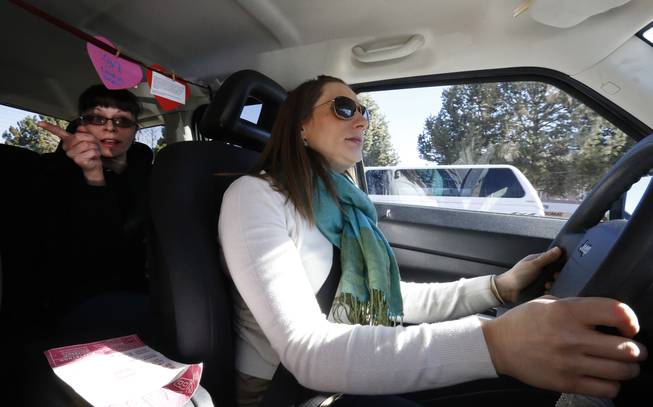
Brennan Linsley / AP
In this Feb. 28, 2014, photo, Lyft driver Brittany Cameron drives her vehicle as she gives a ride to Jennie Morris in Denver. Ride-sharing companies Uber and Lyft are now serving Nevada.
Thursday, Aug. 6, 2015 | 2 a.m.
Checking the job listings on Craigslist, it’s hard to miss an ad for Lyft. The company is averaging three posts a day that promise drivers $35 an hour and up to $1,500 a week.
Ride-sharing companies like Uber and Lyft might not be allowed in Las Vegas yet, but that doesn’t mean they don’t have a brick-and-mortar presence. Both Uber and Lyft have set up outposts in the valley, even as their day-to-day operations are on hold with regulators deciding what entry fee to charge.
And, similar to how the companies are changing how people get around, they’re also changing what an office looks like.
Uber has been operating out of Work in Progress, a downtown co-working space off Fremont Street. Lyft, its competitor, has been working in Co-Operate, which has locations on Main and Fremont streets. Although the two companies are headquartered in the Bay Area, they have already dispatched employees to oversee the local market, including driver training.
"When Uber becomes operational in a market, we work hard to establish on-the-ground operations in order to connect locally with riders and drivers,” Steve Thompson, general manager of Uber Nevada, said in a statement.
In addition to Uber, other ride-sharing companies operating out of Work in Progress include massage service Zeel and Postmates, which delivers food.
Postmates Merchant Account Manager Staci Perkins said having someone with direct knowledge about the area can help Postmates operate more effectively. “You can really relate to the traffic — and the heat,” Perkins said while drinking coffee at O Face Doughnuts about three blocks from the co-working space.
Perkins, who has been working for Postmates for about nine months, said the on-demand delivery company sends a team to most of the markets in which it operates, allowing the company to make personal connections that support marketing efforts and result in promotional collaborations. She cited Postmates’ recent collaboration with Capriotti’s sandwiches.
There are additional benefits to working out of a collaborative office space, such as providing an instant office-style environment for employees who otherwise would be working without colleagues, and the quirky startup office environments — one with board games and ping-pong tables — Silicon Valley boasts.
“Remote workers don’t feel so lonely,” said George Moncrief, who runs Work in Progress.
Unlike Work in Progress, which caters to tech startups, Co-Operate, with two locations downtown is a workplace for varied small businesses, including an insurance agency, two architecture firms and a payment processing company. Similar to Work in Progress though, it also serves as a space for on-demand companies entering the local market.
A government relations manager and a community affairs manager for Lyft have used the space. Handy, an app-based service that dispatches independent contractors to help with home cleaning and repair, also has a regional employee who works out of Co-Operate.
"It’s beneficial for them to land in a co-working space where they can share resources with other people and share knowledge,” said Co-Operate’s community manager Nicole Mastrangelo, who used to be at Work in Progress.
Mastrangelo provides this example. Instead of having to make their own connection to get in contact with a representative at say, the Chamber of Commerce, they could ask for help from another company’s employee.
Adam Brown, a regional manager for Handy in Las Vegas, Phoenix and Denver, said that the company conducts its onboarding at Co-Operate, preparing its contracted workers with their technology.
Brown said having someone actually present in the region helps smooth over disconnects between independent contractors whose only contact with the company might be during the hiring process. "There are some situations where they just want to talk to someone,” he said.
For some companies, this personal touch can be critical. On-demand companies, especially ride-sharing companies like Uber and Lyft, while popular, have faced criticism from politicians for categorizing their workforce as independent contractors and for flouting established regulations.
Putting employees on the ground in local markets is a good sign, according to Brown, Handy’s regional manager, who said the Southwest is generally underserved by startups that seek to establish a foothold in several national markets. "They launch in New York and San Francisco,” he said. "Then it’s an afterthought in some of these other cities."


Join the Discussion:
Check this out for a full explanation of our conversion to the LiveFyre commenting system and instructions on how to sign up for an account.
Full comments policy